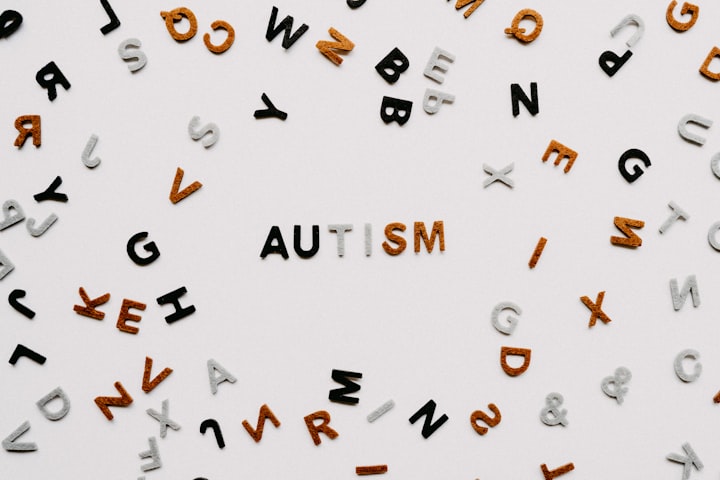Neuro-Spicy
The Changing Perception of Non-Neurotypicals

*Neuro-Spicy, for those unaware, is a term coined when searching for an alternative to the "Functioning" labels, where someone compared the degree to which a person was affected by Autism, ADHD or other conditions to the spice-level warnings on a menu. I'm usually about a 2-chilli, in that there's a noticiable effect on my daily life but it's usually under control. In situations like the one described in this story, I can drop to a 3- or 4-chilli rating, where I can't talk and recovery time is needed. 5-chilli rated moments - where you're crying and screaming for a milk jug/Autistic Burnout or Meltdown - are rare, but they happen.
It's funny, how much of an impact a moment can have.
Words spoken in the span of a breath, a single action, forgotten minutes later, yet irrevocably seared into the memory of another.
"You can't blame them, they're on the spectrum."
Normally, I'd be happy to hear such acceptance. I've been an advocate for the differently-abled for years, and not just because of my own personal experiences.
But, there was some additional context to the situation. The speaker was a person who had, in the past, torn me to shreds over a misinterpretation of a social situation, where I had accidentally upset someone, resulting in this person cornering me, scolding me for a good half hour, and liberal use of the phrase, "You're Autistic, of course you'd say something like that."
The person being defended was someone known to claim discrimination whenever something didn't go exactly how they wanted, and to complain to everyone in authority when they were called out on it.
They probably didn't even remember the incident, which had led to me withdrawing from the Social Group in question for over a year, avoiding any event where they would be present, and a severe increase in my already-considerable Social Anxiety.
They probably walked away, patting themselves on the back for their compassion and inclusivity, while I was frozen in disbelief, trying not to succumb to flashbacks of The Incident.
Where had this attitude been when they'd driven me to tears and isolation, barely able to leave my room for days? Why was I, someone who constantly tried my best, before and after my diagnosis, not worthy of such a defense? What was the difference, and why was I forever on the losing side?
The charitable interpretation is that they'd educated themselves since The Incident, learned better, and just neglected to offer an apology to the other Autistic and Neurodiverse people they'd been unkind to. I can only hope that is the case.
"They can't help it, they're on the Spectrum."
A single moment, easily forgotten by one, yet burned into the memory of another, unable to be forgotten.
I'm about to say something very controversial, especially for me, who has spent so much time and effort advocating for compassion toward neurodiverse individuals: Your diagnosis is not an excuse.
It can be an explanation for why words came out differently to how you meant them, or why you didn't understand what someone meant. Even totally Neurotypical people get things wrong sometimes, and assuming that someone had a bout of word diarrhoea (came out, but definitely not how it was meant to, and now you have a mess to clean...) and asking for clarity is rarely a bad thing.
But there has to be a balance between the burden on others to not be offended, and the burden on yourself to work on not offending people. Asking forgiveness is not always the best tactic, when you can put in the effort to practice your behaviour and not need to apologise in the first place.
Think of it like a food allergy.
Say you're allergic to peanuts. Not fatally allergic, and you can be around trace amounts without suffering more than a bad bout of gas, but you definitely shouldn't be eating them straight.
If you go out to eat, the venue is obligated to provide you with nut-free options and all reasonable efforts to avoid cross-contamination.
However, it is also your responsibility to ask whether a dish contains nuts, carry an epi-pen, and generally avoid South-East Asian venues unless you know what kind of oil they use to cook with and are really careful about reading the ingredients.
A trait common among the Neurodiverse is Rejection Sensetivity Dysphoria. This is characterized predominantly by heightened reaction to the perception of being rejected, including depression, and social anxiety, often manifesting in a seeming desperation to be liked and included.
A friend of mine is an older gentleman who is definitely somewhere on the spectrum, if undiagnosed. He's gentle, soft-spoken, gives amazing hugs, and is generally a wonderful person. He's also not always the best at realizing when he's in someone's personal space, or when he's gone from "sharing interests" to "taking over the conversation", though he's become much better in the 10+ years we've known each other. He's always devastated when he realises that he's made someone uncomfortable, and goes above and beyond to fix the situation or make amends.
Overall, the world is a much nicer place when you assume a mistake, rather than malice. Perhaps if more people did, we wouldn't have situations like the one I mentioned.

If you liked this story, leave a heart, a comment or a tip and share it around, and check out my other work on Medium and Amazon.
About the Creator
Natasja Rose
I've been writing since I learned how, but those have been lost and will never see daylight (I hope).
I'm an Indie Author, with 30+ books published.
I live in Sydney, Australia
Reader insights
Outstanding
Excellent work. Looking forward to reading more!
Top insights
Easy to read and follow
Well-structured & engaging content
Heartfelt and relatable
The story invoked strong personal emotions
On-point and relevant
Writing reflected the title & theme
Compelling and original writing
Creative use of language & vocab
Expert insights and opinions
Arguments were carefully researched and presented
Masterful proofreading
Zero grammar & spelling mistakes







Comments (14)
its good
interesting and informative...I personally enjoyed it while reading
Brilliant! This article is very well written. I loved the use of "word diarrhea". Thank you for sharing your personal experiences and congratulations on your top story status! Very well deserved.
Awesome Article 💯😉Congratulations on your Top Story🎉💖✨😉
Fabulous!!!Congratulations on T S too!!!💖💖💕
Love it! Beautiful 🤩
Spot on Natasja! This👉"the world is a much nicer place when you assume a mistake, rather than malice." Abso-bloody-lutely!!
I learned a lot from your story and congratulations on top story.
I really like this! Congrats on Top Story!
Great insights, Congratulations on Top Story!
Congrats on the TS
Congratulations on your Top Story
This is an excellent informative piece and hope it gets the read it deserves. The Rejection Sensitivity Dysphoria is something like I am feeling at this moment, though I do not consider myself on any of these spectra. Thank you for a wonderful piece and a probable Top Story. I wrote a couple of pieces related to the subject that seem to have been shunned by the Vocal community despite being well-read somewhere else so much so that one is my second most-read Vocal story.
This is what I told my counselor when he asked if having a diagnosis of autism, OCD & clinical depression was good or not. My response was, "It depends on whether the knowledge becomes a tool that helps me to do better, or simply an excuse." I can read social cues & interpret them well, just not naturally. I have to be focusing & very intentional, which is draining & means I'll need a lot of down time after. And just like your older friend, I'm devastated when I think or am actually told that I offended someone. My anxiety goes way up, I feel like I want to cry, & I don't want to be around anyone. I don't know where you are on the spectrum, Natasja, but I commend you for your efforts & especially for insisting on taking responsibility for those times when mistakes are made. It's not easy, & it may feel like crap, but it's better than remaining silent & distant, stewing alone.